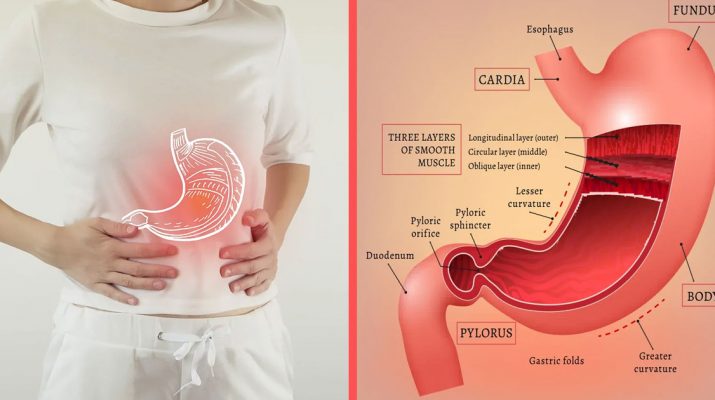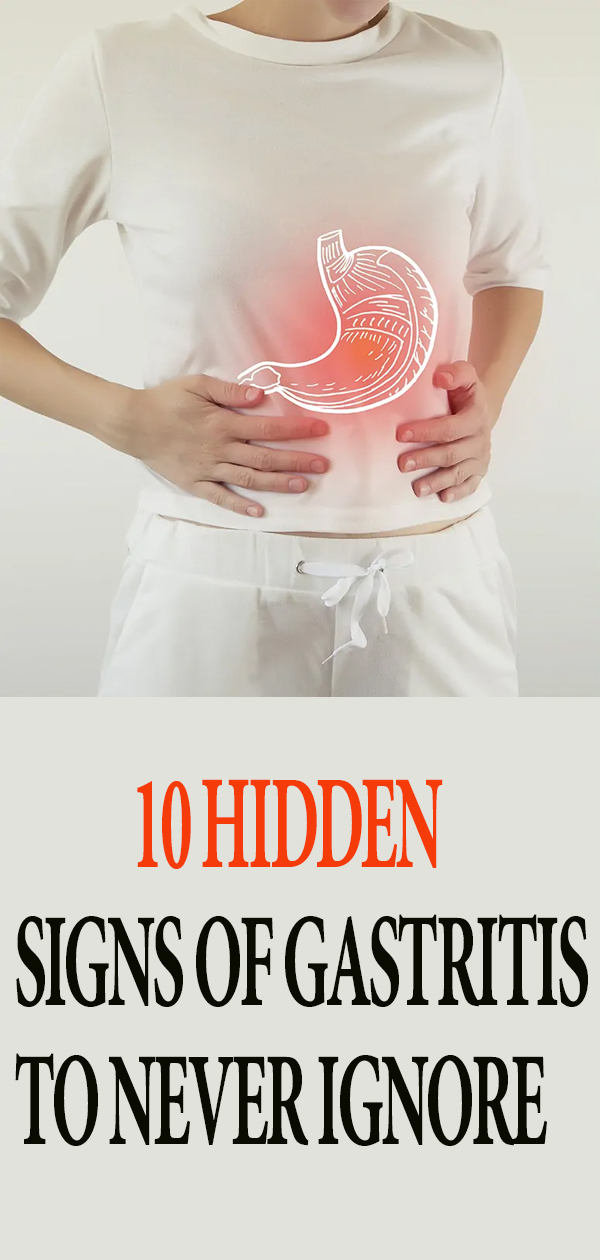Gastritis is a disease characterized by stomach lining inflammation. When untreated, it can lead to stomach ulcers and even cancer. As such, it’s no surprise that many people want to be aware of the signs of this condition.
You would think that such a disorder would be easily noticed, but it can be surprisingly sneaky. A lot of its symptoms are fairly subtle and can easily be attributed to other, less dangerous causes.
In addition, Helicobacter pylori, or H. Pylori, the type of bacteria that causes gastritis, will show itself in certain symptoms that are often overlooked when its infection first takes root. But approximately half of the world’s population has H. Pylori in their body, so there’s a good chance you’re at risk for the disease!
Don’t worry, though. A little positive thinking and a bit of knowledge go a long way. If you’re aware of what to look out for, you’ll be able to know if something is amiss.
Here Are 10 Hidden Signs You Have Gastritis
1. Nausea
Bile is a liquid substance created in the liver and stored in the gallbladder. Typically, its job is simple; it helps the small intestine digest lipids of all kinds. You may also know it as the product that you expel when you vomit – which is why an increased amount of bile can cause you to feel nauseated.
When the bile inside your liver starts to move around due to H. Pylori infection, it can cause feelings of nausea. This infection causes the bile to become displaced, making its way to the stomach instead of the duodenum or the small intestine. It may also cause you to regularly feel bile creeping up your throat when you belch. This is called bile reflux.
Of course, bile movement isn’t necessarily a sign that you have gastritis. It can also point to other issues, such as indigestion, or acid reflux, so don’t rule out other possibilities.
2. A Deficiency In Vitamin B12
Are you deficient in vitamin B12, even though you’re eating the right foods? This vitamin plays a very crucial role in your DNA and blood-related functions. Consuming foods with sufficient B12 can provide plenty of positive benefits. These foods include:
- Eggs
- Trout
- Liver
- Low-fat milk
- Clams
- Salmon
- Fortified cereal
- Greek yogurt
- Sardines
- Beef
- Chicken breast
- Ham
If you’re eating all these foods, then it’s likely that you are getting enough B12 in your diet. But what happens when you have symptoms of a deficiency regardless? You may have signs like:
- Fatigue
- Paleness
- Gas
- Smooth tongue
- Numbness and tingling
- Loss of vision
- Loss of memory
- Heart palpitations
- Lightheadedness
- Diarrhea
- Constipation
- Breath shortness
- Depression
- Muscle weakness
- Loss of appetite
- Behavioral changes
Research has revealed that, when you have gastritis, the body is unable to sufficiently process consumed protein. Without this processing, the B12 vitamin cannot be easily extracted from food. Studies show that this can significantly decrease the levels of B12 within the body.
3. Diarrhea And Abdominal Cramps
Gastritis is quite an unforgiving illness. When it attacks, it does so with several symptoms that often stick around for a minimum of seven days. If this is the case, then you would think that it would be easy for someone to notice that something is wrong, with a week’s worth of symptoms to show for it.
But here’s why this is often overlooked. One of the more obvious symptoms is abdominal cramping, diarrhea, or both. It’s easy for a lot of people to ignore these symptoms, especially if they are not particularly severe. Even if it comes with vomiting, some people might think it’s just food poisoning.
More confusingly, the consumption of spicy or spoiled foods can cause these symptoms to worsen. This is because the H. Pylori is affected and intensified by these items, causing them to affect you even more negatively.
4. Feeling Full Quickly
Do you tend to feel sated – and perhaps too sated – after even small meals? You’ve barely touched your lunch, but all of a sudden you’re feeling like you can’t eat another bite. This could be a hidden sign of gastritis.
Why does this happen? H. Pylori often causes excess gas to be stored within the stomach, which causes you to feel full and makes it hard for you to want to eat. Unfortunately, you aren’t actually full – so cutting down on your meals, as a result, can lead to nutritional problems on top of the bacterial infection.
Take extra note of how your body feels when this happens. Is it just a bloated fullness that you can attribute to a menstrual cycle or prior activity? Or is it also accompanied by discomfort in your upper body? If you said yes to the latter, speak to a doctor, as it may be gastritis.
5. Intestinal Bleeding
It’s safe to say that intestinal bleeding is never a good sign, and no amount of positive thinking will change that! Usually, the most obvious symptoms will appear in your vomit or feces in the form of blood among the waste, but there may be some other indicators, such as:
- Dizziness
- Pale skin
- Abdominal cramps
- Breathing shortness
- Fatigue
- Tarry stools
- Black Stools
- Feeling faint
- Weakness
Blood showing up in waste is always a good reason to take a trip to a doctor’s office. Even if it’s not gastritis, a test known as an endoscopy will need to be done to ensure that nothing is wrong.
There is a whole host of conditions that have this as a symptom. Plus, acute bleeding can cause you to actually go into shock. Symptoms of this include:
- Lack of urination
- Blood pressure decrease
- A high pulse rate
- Losing consciousness
If you experience these symptoms, get to a doctor right away, or call for emergency assistance!
6. Feeling Bloated
Bloatedness is a very common symptom of countless different things. A lot of them are, admittedly, not serious. You may deal with bloatedness as a result of:
- Too much salt consumption
- Weight gain
- Drinking too many carbonated drinks
- Eating too much:
- Carbohydrates
- Dairy
- Fat
- Fructose
- Eating too quickly
- Excess gas
- Overeating
- Constipation
- Menstruation
- Celiac disease
In most cases, there’s not much you have to worry about when it comes to stomach bloating. The issue comes when certain other problems come into play, such as:
- Constant bloatedness
- Bloatedness after meals
- Belly discomfort
- Diarrhea
- Indigestion after every meal
- Loss of appetite
- Fever
- Weakness
If you experience bloatedness with these symptoms, then it’s a good idea to talk to a doctor, as it could point to gastritis. If you’re lucky, it may just be dyspepsia – but it’s always better to be safe than sorry when your health is involved!
7. Inflammatory Bowel Disease
Inflammatory bowel disease (IBS) is a rather annoying disorder that can cause a lot of havoc to occur within the digestive system. Unfortunately, it also puts you at a higher risk for developing gastritis. But it’s not the only condition with this unhappy effect. Ulcerative colitis, or Crohn’s disease, also causes this issue.
As such, if you have a diagnosis of either of these conditions – or any other digestive problems – keep yourself extra vigilant on the watch for gastritis. If you notice symptoms, speak to a doctor. More than 30% of all ulcerative colitis patients develop H. Pylori infections!
8. Weight Loss
A lot of us see weight loss as a purely positive thing. This is a very dangerous mentality, though. Why? It can cause us to overlook the fact that sudden, unexplained weight loss is typically a sign that something is wrong. Case in point: cancer patients often lose a lot of weight; it’s one of the more obvious symptoms (and the fact that gastritis can progress to stomach cancer makes this even more concerning).
- Pylori doesn’t necessarily cause you to stop being able to absorb food. But it does provide plenty of other symptoms that can, slowly but surely, chip away at your weight and lead to eventual slimming over time. For example, your quick fullness after small meals will prevent overheating, while bloatedness and nausea cause decreased appetite.
9. Burping More Than Usual
We already mentioned a lot of times that H. Pylori causes gas buildup, which is why you might feel bloated or full when you have gastritis. Another side effect from this same issue is that you may burp – or even pass gas – more than usual.
Why, though, is burping such a prominent gastritis symptom? Well, the stomach uses specially produced acids to process, break down, and digest the bits of food we eat. In order to properly protect the lining of the stomach, a barrier of mucus is created.
- Pylori causes the mucus barrier to become less strong. Over time, this can lead to painful stomach ulcers. But in the beginning, it mainly manifests in unattractive belches as the enzyme activity within the stomach begins to change.
10. Anemia
Anemia refers to a lack of red blood cells in the body. In most cases, this is caused by a lack of iron – but, in other cases, it is because of a different underlying condition, like gastritis. If you have a positive diet that incorporates a good amount of iron, then be cautious of anemia signs. Here are some symptoms of anemia: (3)
- Lack of energy
- Breath shortness
- Quick heart rate
- Dizziness
- Cramps in the legs
- Fatigue or exhaustion
- Skin paleness
- Headaches
- Insomnia
How does anemia occur in gastritis? Specifically, it comes as a symptom of a rarer form of the disease known as erosive gastritis. This variation of the disorder causes stomach ulcers, which may then cause your stomach to bleed. This chronic blood loss can easily lead to anemia.
Final Thoughts On Some Hidden Signs You Have Gastritis
Gastritis can become highly dangerous if it is allowed to progress for too long. The good news is that if you know the lesser-known symptoms of gastritis, you will be able to protect yourself from it.
Just as with any condition, the earlier you catch it, the better off you’ll be. If you notice a significant number of these 10 hidden signs you have gastritis, speak to a doctor as soon as possible!


